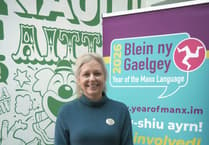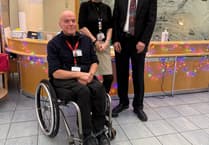Steve Hobbs has worked as a mental health nurse in the island for 40 years. He also started his own holistic psychotherapies and staff development business, SHINE, and has worked within several nurse therapist roles within the NHS and been a psychotherapist for 29 years.
He believes that the global pandemic has had a significant impact on people’s mental health within the island.
One in five children and adolescents in the British Isles is reporting declining mental health, with a 12.18% increase in mental distress, anxiety symptoms being presented as a major cause (source: Mental Health Foundation).
Prior to the pandemic, 60% of employees within the UK had reported symptoms in line with a mental illness due to work-based pressures. And 31% of employees have been diagnosed with a mental illness since the pandemic began (MHFA 2020).
Steve said that there is another half of the UK workforce who consider their place of work to be a safe place.
’Some individuals find their place of work a safe haven with their life stresses coming from challenges/abuse at home,’ he said.
’Modern technology has aided many to complete their work tasks more efficiently, but the flip side is it also makes it more easy to contact others and placing a strain on work/life balance. Many employees answer emails late at night and even on annual leave.
’Young adults also face additional challenges. When I was a child, you would knock on your friend’s door to see if they wanted to come and play. Now, various forms of social media and texting are used, but if your friend does not reply does that mean they are no longer your friend?
’What all of these can lead to is the stimulation of worrying and the creation of anxiety. During the lockdowns, anxiety has been one of the major causes of mental distress.’
In the Isle of Man, referrals made to the emergency mental health service increased by more than 50% during 2020.
The Crisis Response and Home Treatment Team (CRHTT) provides a crisis response service for people who are experiencing significant deterioration in their mental health and/or an increase in their psychological distress which requires an urgent response to facilitate a resolution of crisis.
It provides multi-disciplinary assessments and, if appropriate, offers home treatment as an alternative to hospital admission.
Data revealed during the House of Keys in April showed that in 2018, 1,074 referrals were made, 1,144 in 2019 and 1,721 in 2020.
More than a quarter of cases had received services from the home treatment team in excess of two days.
Referrals from CRHTT to the Psychiatric Inpatient Service were 81 in 2018, 75 in 2019 and 78 in 2020.
Police data recently revealed that during the period March 3 to March 21, there had been 11 calls made to the 999 control room by people threatening to end their life, with one person who attempted to commit suicide.
Sixteen calls overall were made to the control room in the same period which related to mental health issues.
Steve said that often anxiety is not just about the physical symptoms, but it also impacts our ways of thinking.
’It makes beliefs negative and this then impacts our behaviour/actions and usually results in avoidance,’ he said.
’Anxiety and panic attacks can be activated from three different processes: firstly, we may notice uncomfortable bodily sensations and worry an anxiety state or attack is pending, and with the negative thoughts it probably will.
’Sitting worrying may be responded to by the brain, thus releasing adrenaline and again the physical symptoms develop and anxiety takes hold.
’Or the anxiety may be triggered because we have avoided doing something and our self-criticism becomes a mental threat and so the negative cycle starts again.’
Steve’s developed a system to help the "fight or flight" response to anxiety, which can be an internal hell for many people whose anxiety is continually reactivated internally.
He said: ’Deep breathing is the key to regaining emotional regulation and stopping the impact of anxiety. Deep breathing isn’t gasping for air or taking such deep breaths you become dizzy. It requires careful control and to achieve deep breathing use this simple method:
’Breathe in through your nose normally and whilst you suck the air into your lungs, count in your head from one to five seconds. When you get to five, don’t hold your breath, just breathe out and repeat. It will take 10 seconds to breath in and out once. If you have trouble breathing or reduced lung capacity, counting from one to four will work.’
Steve said this simple exercise works on all areas of the anxiety cycle, the counting switching the focus from the part of the brain associated with processing emotions and triggering the flight or fight reaction.
’The regulated breathing and slowing down of the diaphragm muscle is detected by the nervous system, resulting in a hormone being released into the blood stream and countering the effects of adrenalin,’ explains Steve.
’This quickly settles the unpleasant bodily sensations and tension within the muscles. The whole process is also a positive self-help exercise, so it breaks the chain of negative behaviour.’
Steve continued: ’Anxiety is only one presenting feature of our declining mental wellbeing. Depression has been predicted by the World Health Organisation to be the leading cause of illness, worldwide, by 2030.
’It’s important to look after ourselves and maintaining positive mental health isn’t that complicated.’
Steve’s five themes identified by research to help support overall wellbeing are:
’Attachments: connections may be varied, family/friends, work colleagues, neighbours. Humans release hormones during physical contact and produce a feeling of wellbeing. Ensure you’re active every day, choose a physical activity that suits your level of mobility/fitness. Take notice, develop a curious attitude to life, such as the changing seasons, watch a blackbird battle a worm, savour the moment.
’Keep learning, try a new skill or rediscover an old interest, it will make you feel more confident as well as fun. Finally, give - or do something nice for a friend or stranger. Volunteer or help the environment by picking-up rubbish out and about. Giving back to the community and the environment takes us full circle as it helps us create important connections.’
Steve Hobbs’ website is at www.shine-psychotherapies.com/




